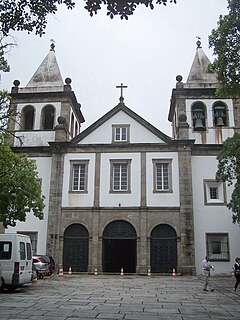
Rio de Janeiro, or simply Rio, is anchor to the Rio de Janeiro metropolitan area and the second-most populous municipality in Brazil and the sixth-most populous in the Americas. Rio de Janeiro is the capital of the state of Rio de Janeiro, Brazil's third-most populous state. Part of the city has been designated as a World Heritage Site, named "Rio de Janeiro: Carioca Landscapes between the Mountain and the Sea", by UNESCO on 1 July 2012 as a Cultural Landscape.

José Bonifácio de Andrada e Silva was a Brazilian statesman, naturalist, professor and poet, born in Santos, São Paulo, then part of the Portuguese Empire. He was one of the most important mentors of Brazilian independence, and his actions were decisive for the success of Emperor Pedro I. He supported public education, was an abolitionist and suggested that a new national capital be created in Brazil's underdeveloped interior. His career as naturalist was marked by the discovery of four new minerals.

Euclides da Cunha was a Brazilian journalist, sociologist and engineer. His most important work is Os Sertões, a non-fictional account of the military expeditions promoted by the Brazilian government against the rebellious village of Canudos, known as the War of Canudos.

Empresa Brasileira de Infraestrutura Aeroportuária, Infraero in short, is a Brazilian government corporation founded in 1973, authorized by Law 5,862, being responsible for operating the main Brazilian commercial airports. In 2011 Infraero's airports carried 179,482,228 passengers and 1,464,484 tons of cargo and operated 2,893,631 take-offs and landings. It manages 63 airports, which represent 97% of the regular air carriage activity in Brazil, 81 Air Navigation Stations and 32 Cargo Logistics Terminals.

Science and technology in Brazil has entered the international arena in recent decades. The central agency for science and technology in Brazil is the Ministry of Science and Technology, which includes the CNPq and Finep. This ministry also has direct supervision over the National Institute for Space Research, the National Institute of Amazonian Research, and the National Institute of Technology (Brazil). The ministry is also responsible for the Secretariat for Computer and Automation Policy, which is the successor of the SEI. The Ministry of Science and Technology, which the Sarney government created in March 1985, was headed initially by a person associated with the nationalist ideologies of the past. Although the new minister was able to raise the budget for the science and technology sector, he remained isolated within the government and had no influence on policy making for the economy.

The Instituto Militar de Engenharia is an engineering institute maintained by the Brazilian Army with Federal support. IME is the oldest and one of the best ranked engineering schools in Brazil, according to the Ministry of Education of that country, having systematically achieved first place in several of its engineering degrees. Its current campus is located in Urca, Rio de Janeiro, right across the entrance to the very famous Sugar Loaf cable car.

The Federal Rural University of Rio de Janeiro is a centenary public university located in Seropédica in the State of Rio de Janeiro in Brazil. It possesses the largest campus among Latin American universities, and is known for being the first university to have agriculture related courses in Brazil.

The Federal University of the State of Rio de Janeiro, is one of the four federally funded public universities in the State of Rio de Janeiro, Brazil. It has several campuses in the city of Rio de Janeiro, including two in Urca neighborhood. It was established on June 5, 1979. The university was ranked in the 23rd place in the Government's ENADE classification, in 2006. In 2010, it was given a score of 4 out of 5 in ENADE's system of evaluation.
Vicentino Prestes de Almeida, was a Brazilian paleontologist. He died on October 28, 1954, in São Pedro do Sul.
Irajá Damiani Pinto, was a Brazilian paleontologist and professor at the Federal University of Rio Grande do Sul, a member of the Brazilian Academy of Sciences, and a two time president of the Brazilian Geological Society.
NAB – Navegação Aérea Brasileira was a Brazilian airline founded in 1938. In 1961 it was sold to Lóide Aéreo Nacional.

The Federal Institute of Rio de Janeiro, or in full: Federal Institute of Education, Science and Technology of Rio de Janeiro is an institution that offers high and professional educations by having a pluricurricular form. It is a multicampi institution, specialising with professional and technological education in different areas of knowledge . It was known previously as Centro Federal de Educação Tecnológica de Química de Nilópolis. IFRJ is a federal institution, public, directly vinculated to the Ministry of Education of Brazil.

Mateus Solano Schenker Carneiro da Cunha is a Brazilian actor.

The Abbey of Our Lady of Montserrat, more commonly known as the Mosteiro de São Bento (Monastery of St. Benedict), is a Benedictine abbey located on the Morro de São Bento in downtown Rio de Janeiro, Brazil. The Mannerist style church is a primary example of Brazilian colonial architecture in Rio and the country.
Roberto Cunha Ribeiro Filho is a Brazilian professional football player who currently plays for C.D. Cova da Piedade in Portugal as a centre-back.

Belmond Copacabana Palace is a hotel in the city of Rio de Janeiro, Brazil, facing Copacabana beach. Designed by French architect Joseph Gire, it was built in a style that follows the line and model of the great beach hotels of the nineteenth and early twentieth centuries, and opened on August 13, 1923.

Events in the year 2015 in Brazil:

Eduardo Cosentino da Cunha, is a Brazilian politician and radio host, born in Rio de Janeiro. He was President of the Chamber of Deputies of Brazil from February 2015 till May 5, 2016, when he was removed from the position by the Supreme Court. BBC News labeled him the "nemesis" of Brazilian President Dilma Rousseff. He was indicted in the scandal known as Operation Car Wash involving the state-owned oil company Petrobras. Cunha was suspended as speaker of the Chamber of Deputies by the Supreme Court on the request of the Prosecutor-General due to allegations that he had attempted to intimidate members of Congress and obstructed investigations into his alleged bribe-taking. Cunha resigned from his position later, on July 7, 2016, after a disciplinary process in Congress that had lasted nine months, making it the longest in Brazilian Congressional history. A series of legal manoeuvres had stalled the process and kept Cunha in charge of the Chamber of Deputes. While the Chamber's Commission of Ethics was divided on the issue until June, the Chamber of Deputies plenary, on September 12, 2016, voted 450-10 in favour of stripping Cunha of his position as federal deputy for breaching parliamentary decorum by lying about secret offshore bank accounts.

Edgar Roquette-Pinto was a Brazilian writer, ethnologist, anthropologist and physician. He was a member of the Academia Brasileira de Letras and is regarded as the father of radio broadcasting in Brazil.

Cláudia Cordeiro Cruz is a Brazilian journalist. She was an anchor on Fantástico, Jornal Hoje and RJTV. Claudia is married to politician Eduardo Cunha, former president of the Chamber of Deputies, with whom he has a daughter and three stepsons. Claudia provides services to various companies and has been questioned in personal spending function. Claudia is an associate of Cunha in some companies, including Jesus.com and C3 productions.


















